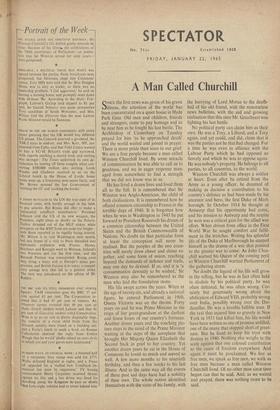A Man Called Churchill
C INCE the first news was given of his grave Oiliness, the attention of the world has been concentrated on a quiet house in Hyde Park Gate. Old men and children, friends and strangers, came to pay homage and to be near him as he fought his last battle. The Archbishop of Canterbury on Tuesday prayed for him 'as he approached death' and the world waited and joined in prayer. There is more pride than tears in our grief. We are a free people because a man called Winston Churchill lived. By some miracle of communication he was able to call us to greatness, and we in eager response man- aged from somewhere to find a strength that we did not know was in us.
He has lived a dozen lives and lived them all to the full. It is remembered that Sir Winston was Anglo-American, the child of both civilisations. It is remembered how he offered common citizenship to France in the terrible days of 1940. It is forgotten how when he was in Washington in 1943 he put forward to President Roosevelt his dream of a common citizenship between the United States and the British Commonwealth of Nations. No. doubt (in that particular form at least) the conception will never be realised. But the peoples of the two coun- tries will surely draw closer and closer to- gether, and some form of union, reaching beyond the demands of defence and trade, may one day be devised. If so, and it is 'a consummation devoutly to be wished,' Sir Winston may also be remembered as the man who laid the foundation stone.
His life swept across the years. When at the age of twenty-six, and already a national figure, he entered Parliament in 1900, Queen Victoria was on the throne. Forty years on and he was Prime Minister in the reign of her great-grandson at the darkest and finest hours of our country's fortunes. Another dozen years and the touching pic- ture stays in the mind of the Prime Minister waiting at the steps of the aeroplane that brought Her Majesty Queen Elizabeth the Second back in grief to her country. Yet another dozen years he sat in the House of Commons he loved so much and served so well. A few more months to his ninetieth birthday, and then a few 'weeks to his last illness. And in the same way all the events of these past sad days have had a nobility of their own. The whole nation identified themselves with the visits of his family, with the hurrying of Lord Moran to the death- bed of his old friend, with the remorseless news bulletins, with the sad and growing realisation that this time Mr. Greatheart was fighting his last battle.
No political party can claim him as their own. He was a Tory, a Liberal, and a Tory again, and yet could, and did, claim that it was the parties not he that had changed. For a time he was even in alliance with the Labour Party which he had opposed so fiercely and which he was to oppose again. He was nobody's property. He belongs to all parties, to all countries, to the world.
Winston Churchill was always a soldier at heart. Even after he retired from the Army as a young officer, he dreamed of making as decisive a contribution to his country's defence as had been made by his ancestor and hero, the first Duke of Marl- borough. In October 1914 he thought at Antwerp that his opportunity had come, and his mission to Antwerp and the respite he won was a critical gain for the allied war effort. When driven from office in the First World War he sought comfort and fulfil- ment in the trenches. Writing his splendid life of the Duke of Marlborough he steeped himself in the drama of a war that pointed to the greater war to come. As John Chur- chill warned his Queen of the coming peril so Winston Churchill warned Parliament of the gathering storm.
No doubt the legend of his life will grow in the telling, but he was in fact often held in disdain by his political party, he was often defeated, he was often wrong. Cer- tainly but generously wrong about the abdication of Edward VIII, probably wrong over India, possibly wrong over the Dar- danelles. He was a lovable fallible man. If the taxi that injured him so gravely in New York in 193 I had killed him, his life would 'have been written as one of promise unfilled, one of the many that stopped short of great- ness. But he lived to keep his tryst with destiny in 1940. Nothing else weighs in the scale against that one colossal contribution to the cause of freedom everywhere. And again it must be proclaimed. We live as free men, we speak as free men, we walk as free men because a man called Winston Churchill lived. Of no other man since time began can that be said. And, as we waited and prayed, there was nothing more to be said.






































 Previous page
Previous page